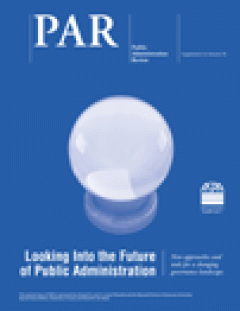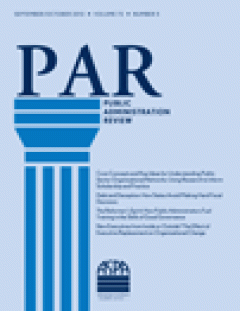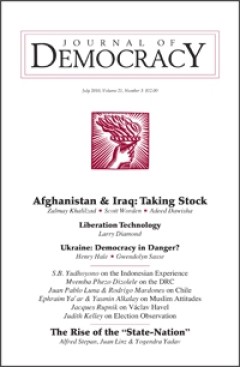Filter by

Learning from the Past, Committing to the Future : A Practitioner’s View of…
American democracy is at a pivotal moment: electoral dysfunction, low levels of participation, divisive politics, and power imbalances dominate governance and impede our ability to resolve critical issues facing the nation. In this environment, the author argues, our ability to be the representative system of government we claim is in question. Using Harold D. Lasswell�s 1942 essay �The Develop…
- Edition
- Vol 70, Issue Suppl s1, Dec 2010, pages s273–s283
- ISBN/ISSN
- 00333352
- Collation
- -
- Series Title
- Public Administration Review
- Call Number
- -

Governance, Structure, and Democracy : Luther Gulick and the Future of Public…
Luther Gulick was both an academic and a reformer. In the latter role, he thought seriously about what the future of public administration might look like. This essay examines his work as a lens through which to view the future of public administration in 2020. Gulick suggests that public administration needs a governance orientation to link scholarship with the realities of practice, a recogni…
- Edition
- Vol 70, Issue Suppl s1, Dec 2010, pages s284–s291
- ISBN/ISSN
- 00333352
- Collation
- -
- Series Title
- Public Administration Review
- Call Number
- -

The Duty to Take Care : President Obama, Public Administration, and the Capac…
President Barack Obama inherited many challenges as he entered the White House. One of the most important obligations he faced was the constitutional duty to �take care that the laws be faithfully executed.� Meeting that commitment has been rendered more difficult because Obama seems not to have recognized that the people and organizations of the executive branch are facing a crisis in the capa…
- Edition
- Volume 71, Issue 1, Jan/February 2011, pages 7–18
- ISBN/ISSN
- 00333352
- Collation
- -
- Series Title
- Public Administration Review
- Call Number
- -

Trends in the Study of Public Administration : Empirical and Qualitative Obse…
What are the apparent research and methodological trends in PAR�s content over the past decade? From the perspective of the journal�s 70-year history, with its aim to �mesh� practitioner and academic knowledge creation, topical coverage since 2000 reflects striking continuity, emphasizing many of the �bread and butter� administrative issues such as planning, human resources, budgeting, and publ…
- Edition
- Volume 71, Issue 1, Jan/Feb 2011, pages 19–33
- ISBN/ISSN
- 00333352
- Collation
- -
- Series Title
- Public Administration Review
- Call Number
- -

Real Reform or Change for Chumps : Earmark Policy Developments, 2006–2010
In response to widespread perceptions of problems associated with congressional earmarks, reform efforts began in late 2006 and continued through 2010. This essay summarizes those problems, explains the distribution of earmarks within Congress, and documents their rise and relative fall between 1991 and 2010 using government and public interest group databases. The author explains and critiques…
- Edition
- Volume 71, Issue 1, Jan/Feb 2011, pages 34–44
- ISBN/ISSN
- 00333352
- Collation
- -
- Series Title
- Public Administration Review
- Call Number
- -

More Similarities or More Differences? Comparing Public and Nonprofit Manager…
Existing research on career motivations tends to focus either on the difference between private and public organizations or on the difference between nonprofit and for-profit firms. Although commonalities exist, the literature suggests that there also are many differences in what motivates public and nonprofit employees. Employing data from the National Administrative Studies Project III, this …
- Edition
- Volume 71, Issue 1, Jan/Feb 2011, pages 45–56
- ISBN/ISSN
- 00333352
- Collation
- -
- Series Title
- Public Administration Review
- Call Number
- -

Taking Nonprofit Intermediaries Seriously : A Middle-Range Theory for Impleme…
The federal government often works through nonprofit intermediaries to reach and empower communities in the United States. One increasingly popular policy strategy is to offer grant funding to intermediary organizations in an effort to strengthen communities. Funded intermediaries are tasked with building the capacity of faith-based and community organizations at the local level, but the policy…
- Edition
- Volume 71, Issue 1, pages 57–66, Jan/Feb 2011
- ISBN/ISSN
- 00333352
- Collation
- -
- Series Title
- Public Administration Review
- Call Number
- -

Soldiers to Citizens : The Link between Military Service and Volunteering
Research shows that military service is linked with political engagement, such as voting. This connection is strongest for minorities. The authors explore the relationship between military service and volunteering. They conclude that military service helps overcome barriers to volunteering by socializing people with civic responsibility norms, by providing social resources and skills that compe…
- Edition
- Volume 71, Issue 1, pages 67–76, Jan/Feb 2011
- ISBN/ISSN
- 00333352
- Collation
- -
- Series Title
- Public Administration Review
- Call Number
- -

Predictors of Administrative and Technological Innovations in Nonprofit Organ…
This study examines the effects of human and structural/process factors on two types of innovation�administrative and technological�in a sample of nonprofit organizations. The results indicate that factors that are favorable to administrative innovations differ from those that are conducive to technological innovation. Three variables are significant predictors of administrative innovation: cen…
- Edition
- Volume 71, Issue 1, pages 77–86, Jan/Feb 2011
- ISBN/ISSN
- 00333352
- Collation
- -
- Series Title
- Public Administration Review
- Call Number
- -

Deconstructing School Choice : Problem Schools or Problem Students?
School choice has developed into one of the most contentious policy debates in K�12 education. Proponents argue that choice leads to competition among schools, thereby raising school quality for all students, while opponents claim that school choice often results in racial segregation and worsens inequity. The findings of this study, collected from qualitative interviews with school administrat…
- Edition
- Volume 71, Issue 1, pages 87–95, Jan/Feb 2011
- ISBN/ISSN
- 00333352
- Collation
- -
- Series Title
- Public Administration Review
- Call Number
- -

Public Administration as an Interdisciplinary Field : Assessing Its Relations…
Public administration is an interdisciplinary field, building on a variety of disciplinary approaches and values. But how well does the field of public administration reflect those values and processes? In contrast to previous arguments regarding the degree to which the field does or should incorporate values and lessons from other academic disciplines, this study provides a systematic assessme…
- Edition
- Volume 71, Issue 1, pages 96–101, Jan/Feb 2011
- ISBN/ISSN
- 00333352
- Collation
- -
- Series Title
- Public Administration Review
- Call Number
- -

Gendering Agricultural Aid : An Analysis of Whether International Development…
Gender-based inequalities constrain women�s ability to participate in efforts to enhance agricultural production and reduce poverty and food insecurity. To resolve this, development organizations have targeted women and more recently �mainstreamed� gender within their agricultural aid programs. Through an analysis of agricultural-related development aid, we examine whether funded agricultural p…
- Edition
- Vol. 25 no. 1, February 2011.pp. 48-74
- ISBN/ISSN
- 08912432
- Collation
- -
- Series Title
- Gender & Society
- Call Number
- -

Why Democracies Survive
As an analysis of recent electoral results shows, the world�s emerging democracies are weathering the global economic crisis surprisingly well. Yet they remain under an even sharper threat from their own failures to deliver good governance.
- Edition
- Volume 22, Number 1, January 2011, .pp. 17-30
- ISBN/ISSN
- 10455736
- Collation
- -
- Series Title
- Journal of Democracy
- Call Number
- -

From the G-8 to the G-20
The financial crisis did not deal a fatal blow to any democracies, but it did hasten an erosion of the influence of the West. In the future, the balance of power among competing regime types may be decided by the emerging-market democracies.
- Edition
- Volume 22, Number 1, January 2011. pp.31-38
- ISBN/ISSN
- 10455736
- Collation
- -
- Series Title
- Journal of Democracy
- Call Number
- -

Latin America’s Growing Security Gap
Striking the right balance between freedom and security is hard, especially in Latin America. Hybrid forces combining military and police elements may be the best means for meeting security challenges without imperiling freedom.
- Edition
- Volume 22, Number 1, January 2011.pp.39-53
- ISBN/ISSN
- 10455736
- Collation
- -
- Series Title
- -
- Call Number
- -

Hong Kong’s Democrats Divide
For the first time ever in the history of Hong Kong, local democratic leaders and Chinese officials have forged a pact on limited democratic reforms. That may have marked a step forward for the cause of democracy in Hong Kong, but it has also led to a sharp split in the democratic camp.
- Edition
- Volume 22, Number 1, January 2011.pp. 54-67
- ISBN/ISSN
- 10455736
- Collation
- -
- Series Title
- -
- Call Number
- -

Arab Islamists : Losing on Purpose?
In most Arab countries, Islamist groups are the only ones with the popular support needed to win free and fair elections. Yet Islamist parties have shown an ambivalence about and in some cases even an aversion to seeking power via the ballot box.
- Edition
- Volume 22, Number 1, January 2011.pp. 68-80
- ISBN/ISSN
- 10455736
- Collation
- -
- Series Title
- Journal of Democracy
- Call Number
- -

Building Democracy While Building Peace
Why are peacebuilding operations rarely able to establish postconflict democracies, and are there other strategies that would yield more successes?
- Edition
- Volume 22, Number 1,January 2011, pp. 81-95
- ISBN/ISSN
- 10455736
- Collation
- -
- Series Title
- Journal of Democracy
- Call Number
- -

Constraining Government Power in Africa
African politics is often characterized as a realm of �informality,� but formal rules and institutions actually loom large, especially with regard to overweening executive power and the reforms that may help to rein it in.
- Edition
- Volume 22, Number 1, January 2011,pp. 96-106
- ISBN/ISSN
- 10455736
- Collation
- -
- Series Title
- -
- Call Number
- -

A Surge to the Center
The left-right ideological divide has begun to narrow in Latin America as citizens and leaders increasingly choose a pragmatic approach to politics and embrace the rules of the democratic game.
- Edition
- Volume 22, Number 1, January 2011.pp. 107-121
- ISBN/ISSN
- 10455736
- Collation
- -
- Series Title
- Journal of Democracy
- Call Number
- -
 Computer Science, Information & General Works
Computer Science, Information & General Works  Philosophy & Psychology
Philosophy & Psychology  Religion
Religion  Social Sciences
Social Sciences  Language
Language  Pure Science
Pure Science  Applied Sciences
Applied Sciences  Art & Recreation
Art & Recreation  Literature
Literature  History & Geography
History & Geography